
- •Предисловие
- •Vocabulary Bank
- •Exercises
- •Vocabulary Bank
- •Exercises
- •Vocabulary Bank
- •Exercises
- •Vocabulary Bank
- •Exercises
- •Travelling
- •Vocabulary Bank
- •Exercises
- •Exercises
- •England
- •Exercises
- •Scotland
- •Exercises
- •Exercises
- •Nothern ireland
- •Exercises
- •Exercises
- •Vocabulary Bank
- •Exercises
- •Vocabulary Bank
- •Exercises
- •Economy of the usa
- •Vocabulary Bank
- •Exercises
- •Washington
- •Vocabulary Bank
- •Exercises
- •Philadelphia
- •Exercises
- •Vocabulary Bank
- •Exercises
- •Shopping in the usa
- •In the supermarket
- •Vocabulary Bank
- •Exercises
- •Some more shopping
- •Vocabulary Bank
- •Exercises
- •Vocabulary Bank
- •Exercises
- •Vocabulary Bank
- •Exercises
- •Card, reserved, key, the best way, sights
- •Booking a room (with questions on the text)
- •Questions on the text
- •Vocabulary Bank
- •Exercises
- •Learning english abroad
- •Schools in the united kingdom
- •Exercises
- •Exercises
- •Secondary education
- •Higher education in the uk
- •Vocabulary Bank
- •Exercises
- •Life at college and university
- •On higher education
- •Exercises
- •In England:
- •In Russia:
- •Oxbridge
- •Exercises
- •Education in russia
- •Exercises
- •Reform in the system of secondary education in russia
- •Exercises
- •Education in the united states of america
- •Exercises
- •Modern psychology
- •Exercises
- •Vocabulary Bank
- •Exercises
- •My plans for future
- •Vocabulary Bank
- •Add to your active vocabulary
- •Teacher’s profession
- •Vocabulary Bank
- •Exercises
- •I. The british monarchy today
- •II.Education in great britain
- •III. Psychological terms
- •Литература
- •Better english through reading совершенствуйте английский чтением
- •4 30007, Г. Саранск, ул. Студенческая, д. 11а
- •4 30000, Г. Саранск, ул. Рабочая, 155
Vocabulary Bank
to bear in mind |
осознавать |
to imply |
подразумевать |
responsibility |
ответственность |
constantly |
постоянно |
behavior |
поведение |
attitude |
отношение |
to provide |
обеспечивать |
citizen |
гражданин |
society, community |
общество |
to share |
делить |
to depend on |
зависеть от |
mutual |
взаимный |
to respect |
уважать |
fruitful |
плодотворный |
to achieve |
достигать |
level |
уровень |
aim |
цель |
honesty |
честность |
cooperation |
сотрудничество |
well-equipped |
хорошо подготовленный |
Exercises
Answer the following questions:
Why have you chosen to become a teacher?
Where will you work after you graduate?
What subject will you teach after you graduate?
When will you graduate? What year are you in now?
It is responsible to bring up new generation, isn’t it? Why?
What subjects in the curriculum will help you to teach children?
What kinds of teaching activities are taught at your Institute?
Do the students at your Institute do teaching practice?
What age group would you like to teach? Why?
What will you do besides teaching your subjects at school?
Should a teacher devote much time to out-of-class work?
What outstanding educators do you know? Whose methods are you going to use in your everyday work? Why? Describe one of these methods.
What are the duties of the teacher?
14.Why is the teacher’s profession considered one of the most important?
2. Form the adjectives from the following nouns:
Responsibility, activity, honesty, kindness, cooperation, respect, thoughts, education, profession, interesting.
3. Study the following sentences. Each word in italics below refers to something already mentioned. Say what each word in italics refers to:
1. When young people choose the profession of a teacher, it is always necessary to bear in mind that teaching is a very difficult job. It implies great responsibility and a lot of activities of different kind both in class and at home.
2. On the other hand, a good teacher does not only give knowledge but also serves a model of behavior for his or her pupils, especially the young ones.
3. The teacher’s task is not only to provide the pupils with information, but also to prepare them for everyday life, to make them good and responsible citizens of the society. While communicating with children a teacher studies them.
4. To achieve this, the teacher’s thinking should be on a higher level than that of the pupils.
5. Teaching is a very difficult job but those who are well-equipped for it will have a happy and interesting life.
Приложение 1. FAMOUS PSYCHOLOGISTS
E RNST
WEBER
(1795-1878)
was born in Wittemburg: Germany, the third of 13 children. He
received his doctorate from the University of Leipzig in 1815, in
physiology. He began teaching there after graduation, and continued
until he retired in 1871.
RNST
WEBER
(1795-1878)
was born in Wittemburg: Germany, the third of 13 children. He
received his doctorate from the University of Leipzig in 1815, in
physiology. He began teaching there after graduation, and continued
until he retired in 1871.
His research focused on the senses of touch and kinesthesia He was the first to show the existence of kinesthesia, and showed that touch was a complex sense composed of senses for pressure, temperature and pain.
His chosen interests led him to certain techniques; first there is the two-point threshold (пороговая величина между двумя точками), which is a matter of measuring the smallest distance noticeable to touch at various parts of the body. For example, the tongue had the smallest threshold (1 mm), and the back had the largest (60 mm).
This is known as Weber's Law, and is the first such «law» relating a physical stimulus with a mental experience.
Ernst Weber also named and studied discipline, psychophysics which he defined as the study of the systematic relationships between physical events and mental events. In 1860 he published The elements of Psychophysics. In this work Weber showed that psychological events are tied to measurable physical events in a systematic way, Which everyone at that time thought impossible.
WILHELM MAX WUNDT (1832-1920), German psychologist, the founder of scientific psychology as an independent discipline. Born in Neckarau, he was educated at the universities of Tubingen and Heidelberg and the Institute of Physiology in Berlin. After teaching physiology at the University of Heidelberg (1858-1874), he taught philosophy at the University of Zurich (1874-1875) and was Professor of Philosophy at the University of Leipzig from 1875 to 1917.
W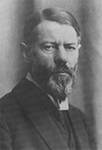 undt
offered the first academic course in psychology in 1862 and
established the first laboratory for experimental psychology in 1879.
He founded the first psychological journal, Philosophische
Studien (Studies
in Philosophy), in 1881.
undt
offered the first academic course in psychology in 1862 and
established the first laboratory for experimental psychology in 1879.
He founded the first psychological journal, Philosophische
Studien (Studies
in Philosophy), in 1881.
Wundt promoted what is known as structuralist psychology, focusing on observations of the conscious mind rather than inference. Wundt also carried out extensive experimental research on perception, feeling, and apperception (a phase of perception where there is full recognition of what has been perceived). His more than 500 published works include Principles of Physiological Psychology (2 volumes, 1873-1874) and the monumental work Elements of Folk Psychology (10 volumes, 1900-1920).He also wrote Logik (1880), Ethik (1886), and System der Philosophie (1889).
A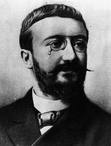 LFRED
BINET
(1857-1911),
French psychologist known for his achievement in developing a
standard intelligence test. Binet was born on July 11, 1857, in Nice.
He was educated at the Sorbonne, where he studied law. However, he
decided to continue his studies in medicine and psychology. In 1889,
at the Sorbonne, he helped to found the first psychological research
laboratory in France. As director of the laboratory, Binet tried to
develop experimental techniques to measure intelligence and reasoning
ability. In 1895, he founded the first French psychological journal,
L'Annee
Psychologique (The
Psychological Year), and used it to publish the results of his
research studies.
LFRED
BINET
(1857-1911),
French psychologist known for his achievement in developing a
standard intelligence test. Binet was born on July 11, 1857, in Nice.
He was educated at the Sorbonne, where he studied law. However, he
decided to continue his studies in medicine and psychology. In 1889,
at the Sorbonne, he helped to found the first psychological research
laboratory in France. As director of the laboratory, Binet tried to
develop experimental techniques to measure intelligence and reasoning
ability. In 1895, he founded the first French psychological journal,
L'Annee
Psychologique (The
Psychological Year), and used it to publish the results of his
research studies.
Binet's most important work was in intelligence testing. With his colleague, psychologist Theodore Simon, he developed a test to measure the mental ability of children. The Binet-Simon Scale first appeared in 1905. It was made up of problems designed to measure general intelligence, and items were graded according to age level. The child's score, based on the number of correct answers, showed the child's mental age.
Binet died in Paris on October 18, 1911. His work on intelligence measurement remained important among psychologists in other countries. The Stanforcl-Binet Scale, an adaptation of Binet's original test, was widely used for many years in the United States, where great importance was paid to intelligence testing.
W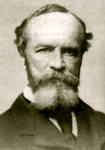 ILLIAM
JAMES
(1842-1910)
is an American psychologist, who developed the philosophy of
pragmatism. James was born in New York on January 11, 1842. His
father, Henry James, was a theologian (тeoлог).
William James attended private schools in the United States and
Europe, the Lawrence Scientific School at Harvard University, and the
Harvard Medical School, from which he received a degree in 1869.
Before finishing his medical studies, he went on an exploring
expedition in Brazil and also studied physiology in Germany. After
three years of retirement due to illness, James became an instructor
in physiology at Harvard in 1872. After 1880 he taught psychology and
philosophy at Harvard; he left Harvard in 1907 and gave highly
successful lectures at Columbia University and the University of
Oxford.
ILLIAM
JAMES
(1842-1910)
is an American psychologist, who developed the philosophy of
pragmatism. James was born in New York on January 11, 1842. His
father, Henry James, was a theologian (тeoлог).
William James attended private schools in the United States and
Europe, the Lawrence Scientific School at Harvard University, and the
Harvard Medical School, from which he received a degree in 1869.
Before finishing his medical studies, he went on an exploring
expedition in Brazil and also studied physiology in Germany. After
three years of retirement due to illness, James became an instructor
in physiology at Harvard in 1872. After 1880 he taught psychology and
philosophy at Harvard; he left Harvard in 1907 and gave highly
successful lectures at Columbia University and the University of
Oxford.
James's first book, the monumental Principles of Psychology (1890), established him as one of the most influential thinkers of his time. The work was devoted to the principle of functionalism in psychology, thus removing psychology from its traditional place as a branch of philosophy and establishing it among the laboratory sciences based on experimental method.
In the next decade James applied his methods of investigation to philosophical and religious issues (npоблемы). He explored the questions of the existence of God, the immortality of the soul (6eccмертие души), free will (cвобода воли), and ethical values (этические ценности) by referring to human religious and moral experience. His views on these subjects were presented in the lectures and essays published in such books as The Will to Believe and Other Essays in Popular Philosophy (1897), Human Immortality (1898), and The Varieties of Religious Experience (1902). The last-named work is a sympathetic psychological account of religious and mystical experiences.
James died in New Hampshire, on August 26, 1910.
J EAN-MARTIN
CHARCOT
(1825-1893)
EAN-MARTIN
CHARCOT
(1825-1893)
Jean-Martin Charcot was born in Paris on November 29, 1825. He received his Master's degree at the University of Paris in 1853. In 1860 he became a professor at his alma mater. Two years later, he began to work at hospital as well. In 1882, he opened a neurological clinic and became known throughout Europe. Students came from everywhere to study the new field. Among them were Alfred Binet and a young Sigmund Freud.
Charcot is well known in medical circles for his studies of the neurology of motor disorders, resulting diseases and localization of brain functions. He is considered the father of modern neurology.
In psychology, he is best known for his use of hypnosis to successfully treating women suffering from the psychological disorder then known as hysteria.
Charcot believed that hysteria was due to a congenitally (врожденно) weak nervous system, combined with the effects of some traumatic experience. Hypnotizing these patients brought on a state similar to hysteria itself. He found that, in some cases, the symptoms would actually lessen after hypnosis, although he was only interested in studying hysteria, not in curing it. Others would later use hypnosis as a part of curing the problem.
Charcot died in France, on August 16, 1893.
SIGMUND FREUD (1856-1939) was born May 6, 1856, in a small town Freiberg. His father was a wool merchant (торговец шерстью) with a keen mind (c тонким умом) and a good sense of humor. His mother was a lively woman, her husband's second wife and 20 years younger. She was 21 years old when she gave birth to her first son, Sigmund. Sigmund had two older half-brothers and six younger siblings (братьев и сестер). When he was four or five the family moved to Vienna, where he lived most of his life,
A brilliant child, always at the head of his class, he went to medical school, where he became involved in research under the direction of a physiology professor Ernst Brucke. Brucke believed in reductionism: «No other forces than the common physical-chemical ones are active within the organism». Freud concentrated on neurophysiology, but only a limited number of positions at the university were available. Brucke helped him to get a grant to study, first with the great psychiatrist Charcot in Paris, then with Bernheim. Both these gentlemen were investigating the use of hypnosis with hysterics.
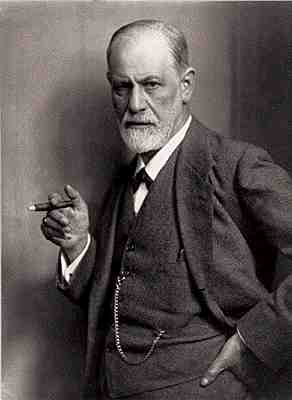 After
spending a short time as a neurologist and director of a children's
ward (детское
отделение)
in Berlin, he came back to Vienna, married his patient fiancee
(невеста)
Martha Bernays, and set up a practice in neuropsychiatry, with the
help of Joseph Breuer.
After
spending a short time as a neurologist and director of a children's
ward (детское
отделение)
in Berlin, he came back to Vienna, married his patient fiancee
(невеста)
Martha Bernays, and set up a practice in neuropsychiatry, with the
help of Joseph Breuer.
Freud's books and lectures brought him both fame and ostracism (oстракизм, гонения) from the traditional medical community. He collected around him a number of very bright students who became the core (ядро) of the psychoanalytic movement. Unfortunately, Freud rejected people who did not totally agree with him. Some separated from him on friendly terms; others did not, and continued reheard to found competing schools of thought.
Freud emigrated to England just before World War II when Vienna became an increasing dangerous place for Jews, especially ones as famous as Freud. Not long afterward, he died of the cancer of the mouth and jaw (челюсть) that he had suffered from for the last 20 years of his life.
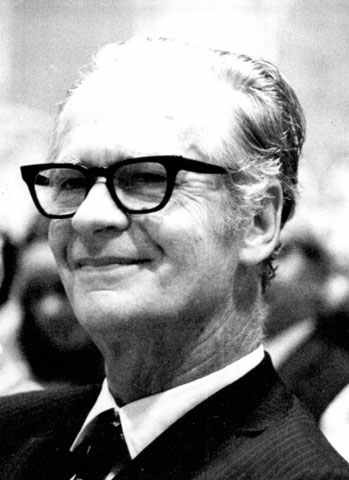 BURRHUS
FREDERIC SKINNER
(1904-1990) was born March 20, in the small Pennsylvania town. His
father was a lawyer, and his mother a strong and intelligent
housewife. His upbringing (воспитание)
was old-fashioned and hard-working.
BURRHUS
FREDERIC SKINNER
(1904-1990) was born March 20, in the small Pennsylvania town. His
father was a lawyer, and his mother a strong and intelligent
housewife. His upbringing (воспитание)
was old-fashioned and hard-working.
Burrhus was an active, out-going boy who loved the out-doors (свежий воздух) and building things, and enjoyed school.
Burrhus received his BA in English from Hamilton College in New York. However, he did not enjoy college life very much. He was an atheist in a school that required daily church attendance (ежедневное посещение церкви).
He wanted to be a writer and did try, sending off poetry and short stories. When he graduated, he built a study (кабинет) in his parents' attic (чердак) to concentrate.
After some traveling, he decided to go back to school, this time at Harvard. He got his master's degree in psychology (MA) in 1930 and his doctorate (Ph.D) in 1931, and stayed there to do research until 1936.
Also in that year, he moved to Minneapolis to teach at the University of Minnesota. There he met and soon married Yvonne Blue. They had two daughters, the second of which became famous as the first infant to be raised in one of Skinner's inventions, the air crib (колыбель). Although it was nothing more than a combination of crib and playpen (детский манеж) with glass sides and air conditioning, it looked like keeping a baby in an aquarium.
In 1945, he became the chairman of the psychology department at Indiana University. In 1948, he was invited to come to Harvard, where he stayed for the rest of his life. He was a very active man, doing research and guiding hundreds of doctoral candidates as well as writing many books. While not successful as a writer of fiction and poetry, he became one of our best psychology writers, including the book Walden II, which is a fictional account of a community run by his behaviorist principles.
August 18, 1990, B. F. Skinner died of leukemia after becoming one of the most famous psychologist after Sigmund Freud.
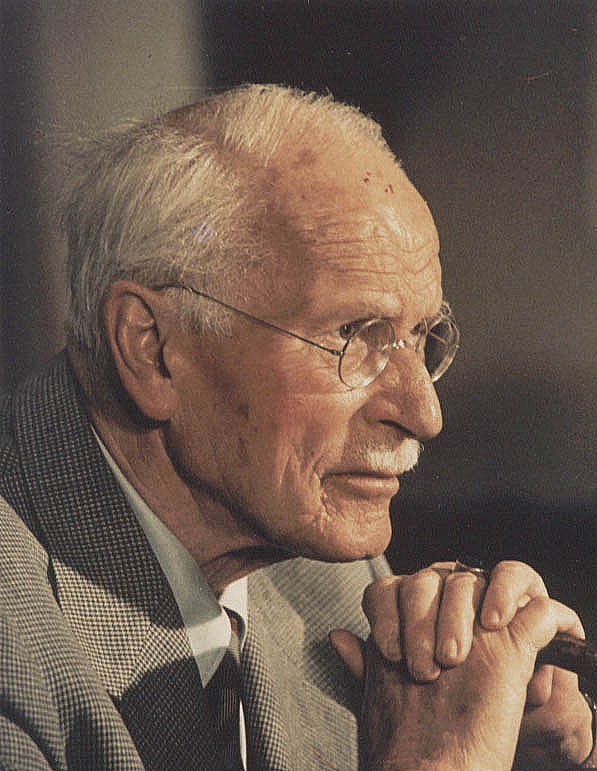 JUNG,
CARL GUSTAV (1875-1961)
was
born on July 26, 1875, in Kesswil, Switzerland, in the family of a
Protestant clergyman (священника).
After graduating in medicine in 1902 from the universities of Basel
and Zurich, with a wide background in biology, zoology, paleontology,
and archaeology, he began his work on word association, in which a
patient's responses to stimulus words revealed what Jung called
«complexes» – a term that has since become universal. These
studies brought him international fame and led him to a close
collaboration with Freud.
JUNG,
CARL GUSTAV (1875-1961)
was
born on July 26, 1875, in Kesswil, Switzerland, in the family of a
Protestant clergyman (священника).
After graduating in medicine in 1902 from the universities of Basel
and Zurich, with a wide background in biology, zoology, paleontology,
and archaeology, he began his work on word association, in which a
patient's responses to stimulus words revealed what Jung called
«complexes» – a term that has since become universal. These
studies brought him international fame and led him to a close
collaboration with Freud.
With the publication of Psychology of the Unconscious (1912), however, Jung declared his independence from Freud's narrowly sexual interpretation of the libido by showing the close parallels between ancient myths and psychotic fantasies and by explaining human motivation in terms of a larger creative energy. He gave up (отказался от) the presidency of the International Psychoanalytic Society and founded a movement called analytical psychology.
During his remaining 50 years Jung developed his theories, drawing on a wide knowledge of mythology and history; on his travels to diverse (разнообразные) cultures in New Mexico, India, and Kenya; and especially, on the dreams and fantasies of his childhood. In 1921 he published a major work, Psychological Types, in which he dealt with the relationship between the conscious and unconscious and proposed the now well-known personality types – extrovert and introvert.
He later made a distinction (сделал различие) between the personal unconscious, or the repressed feelings and thoughts developed during an individual's life, and the collective unconscious, or those inherited feelings (унаследованные чувства), thoughts, and memories shared by all humanity. The collective unconscious, according to Jung, is made up of what he called «archetypes». These correspond to such experiences as confronting death or choosing a mate (выбор пары) and manifest themselves symbolically in religions, myths, fairy tales (сказки), and fantasies.
Jung wrote many works on analytical methods and the relationships between psychotherapy and religious belief. He died on June 6, 1961.
Приложение 2. ГЛОССАРИЙ
